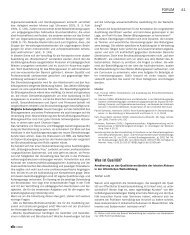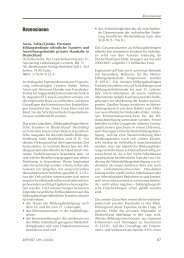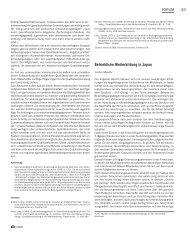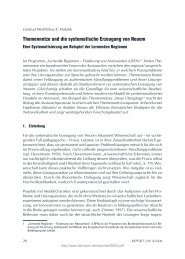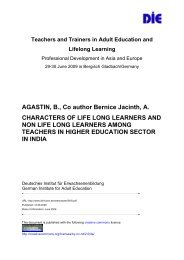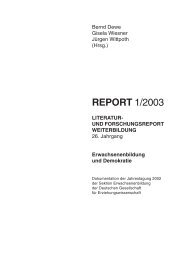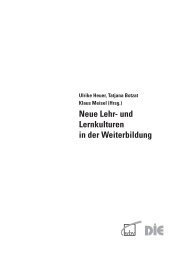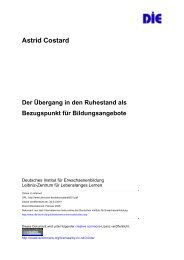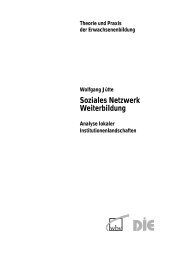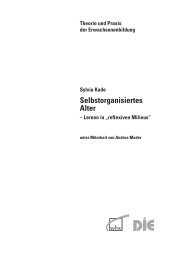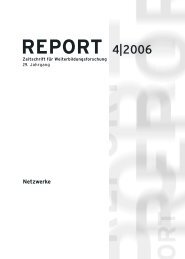Accreditation of Prior Experiential Learning (APEL)
Accreditation of Prior Experiential Learning (APEL)
Accreditation of Prior Experiential Learning (APEL)
Create successful ePaper yourself
Turn your PDF publications into a flip-book with our unique Google optimized e-Paper software.
for those with few or no qualifications and/or who have been out <strong>of</strong> the education<br />
system for a long time. For women in particular who have spent a period <strong>of</strong> time at<br />
home child-rearing <strong>APEL</strong> provides an opportunity to get back into learning at further<br />
and higher education levels and subsequently the labour market at a higher level.<br />
Besides individual social mobility <strong>APEL</strong> also <strong>of</strong>fers an opportunity for career mobility<br />
for particular pr<strong>of</strong>essional groups such as nurses who may purposefully choose to do a<br />
degree for career enhancement or who may have to because <strong>of</strong> the pr<strong>of</strong>essionalisation<br />
<strong>of</strong> the occupation. While <strong>APEL</strong> is used in some countries, for example, the UK, for this<br />
application it is not widespread.<br />
7. Conclusion<br />
The potential <strong>of</strong> <strong>APEL</strong> is still far from realised within the HE sector across Europe.<br />
Where <strong>APEL</strong> is <strong>of</strong>fered it is frequently as a peripheral activity, generally confined to a<br />
specific department such as Continuing Education. Its continual marginality in most<br />
European countries originates from a number <strong>of</strong> reasons. Economically <strong>APEL</strong> is an<br />
expensive system to organise and manage, requiring one-to-one tutoring. As its knowledge<br />
base challenges traditional assumptions about academic knowledge it is perceived<br />
as lacking in academic rigour and hence is given low status within the knowledge<br />
hierarchy. Life experience, especially in traditional universities is not regarded as<br />
valid, academic knowledge. <strong>APEL</strong> learning and teaching processes are also innovative<br />
– perhaps viewed as too radical by some institutions. Universities require a cultural<br />
and organisational shift for <strong>APEL</strong> to be embraced as a mainstream activity. There is,<br />
therefore, the need for:<br />
• a sharing and exchange <strong>of</strong> knowledge and good practice across HE institutions<br />
and European countries. This should involve those at different levels <strong>of</strong> experience<br />
and development in relation to <strong>APEL</strong>;<br />
• higher education institutions to work more closely with other adult education providers<br />
in developing a coherent system <strong>of</strong> <strong>APEL</strong> across the sectors to encourage<br />
progression;<br />
• development <strong>of</strong> a European network on <strong>APEL</strong> involving not only universities but<br />
other educational sectors including both educational policy makers, managers<br />
and practitioners;<br />
• clearer understanding <strong>of</strong> <strong>APEL</strong> and its meaning through a common language while<br />
still recognising different educational and cultural contexts;<br />
• a policy commitment at national and European levels.<br />
Universities and higher education institutions that <strong>of</strong>fer <strong>APEL</strong> are not always maximising<br />
its potential, especially in relation to widening participation and social inclusion.<br />
Fundamentally, many potential learners are not aware <strong>of</strong> the availability <strong>of</strong> <strong>APEL</strong> or if<br />
they are informed they are told different information by different people within the<br />
organisation: “What those institutions tell potential students about <strong>APEL</strong> will be driven<br />
67


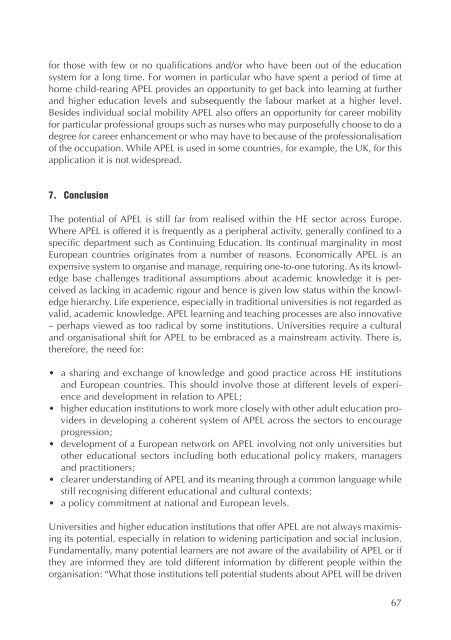
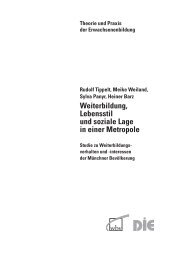
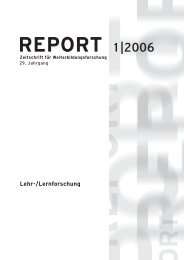
![PDF [KB 892] - Deutsches Institut für Erwachsenenbildung](https://img.yumpu.com/7495168/1/144x260/pdf-kb-892-deutsches-institut-fur-erwachsenenbildung.jpg?quality=85)
